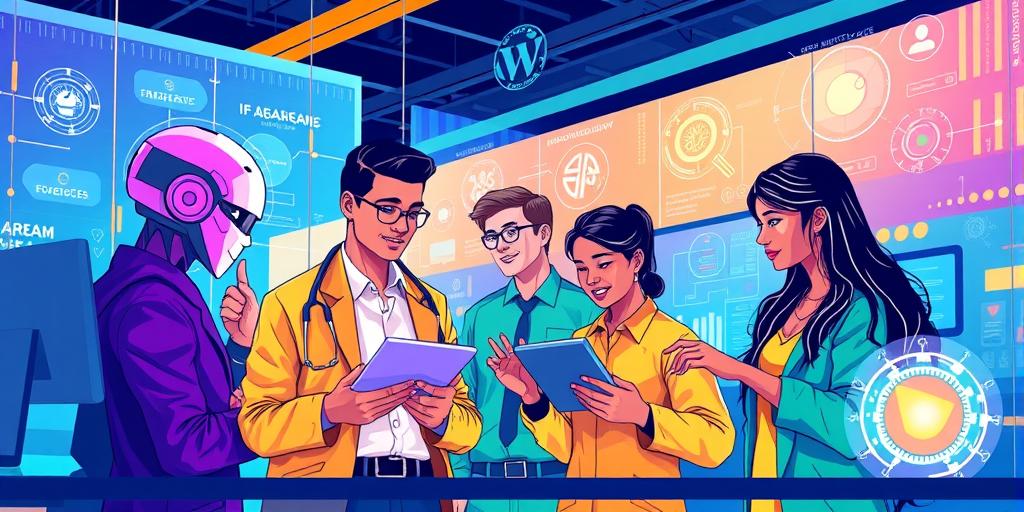How Are Emerging Technologies Shaping Future Jobs?
Are you ready to uncover the secrets of how emerging technologies are revolutionizing the future of work? Prepare to be amazed as we delve into the exciting and sometimes daunting world of technological advancement and its impact on the job market. From artificial intelligence reshaping industries to automation changing daily routines, we’ll explore the most significant shifts and what they mean for you. Let’s embark on this journey to equip you with the insights you need to navigate the future of work successfully!
The Rise of Artificial Intelligence and Automation
Artificial intelligence (AI) and automation are transforming industries at an unprecedented rate. AI-powered systems are now capable of performing tasks once exclusively handled by humans, leading to both excitement and concern. This technological leap isn’t just about replacing human jobs; it’s about creating new opportunities and reshaping existing roles. Think of self-driving cars, robotic process automation (RPA), and AI-driven customer service chatbots – all testaments to this revolutionary change. This technological shift is driving immense growth, creating a demand for AI specialists, data scientists, and automation engineers, while simultaneously impacting many traditional roles.
AI’s Impact on Traditional Industries
The impact extends far beyond the tech sector. Consider healthcare, where AI assists in diagnostics and personalized medicine, or finance, where AI is used for fraud detection and algorithmic trading. These advancements are not simply about increased efficiency, they represent a complete transformation of the way businesses operate, creating a high demand for professionals who can adapt and leverage these technologies. In other words, learning how to work with AI is a critical job skill of the future.
New Job Roles Emerging from AI
While some fear job displacement, the reality is more nuanced. AI is creating entirely new roles, such as AI ethicists, prompt engineers, data annotators, and AI trainers. These emerging positions require specialized skills in handling, interpreting, and managing the complex data sets AI systems rely upon. Upskilling and reskilling initiatives are crucial to help individuals transition into these new, exciting career paths.
The Impact of Big Data and Cloud Computing
The exponential growth of data has created an immense need for professionals who can manage, analyze, and interpret it effectively. Big data analytics and cloud computing are two fields at the forefront of this transformation, creating a high demand for individuals skilled in data mining, cloud architecture, and cybersecurity. These fields offer promising career paths for individuals with analytical skills and a passion for technology. Big Data has become a vital aspect of almost every industry.
Big Data’s Influence Across Sectors
From personalized marketing to weather forecasting, the influence of Big Data is wide-reaching. Companies across various sectors utilize big data to improve decision-making, enhance customer experiences, and gain a competitive edge. This necessitates a strong workforce capable of extracting meaningful insights from vast amounts of data, making this field fertile ground for future career growth.
The Growing Importance of Cybersecurity
As our reliance on technology increases, so does the importance of cybersecurity. Protecting sensitive data and systems from cyber threats has become a critical need, leading to a significant demand for cybersecurity professionals. Experts in areas like ethical hacking, penetration testing, and incident response are highly sought after, emphasizing the crucial role of cybersecurity in the digital age. This is one of the most high-growth and high-paying fields of the future.
Adapting to the Changing Job Market
Navigating the changing job market requires continuous learning and adaptation. Individuals need to acquire new skills, stay updated on technological advancements, and cultivate a growth mindset. Online courses, boot camps, and professional development programs offer opportunities for skill enhancement, enabling individuals to remain competitive in the evolving landscape of the future workplace. The best advice for securing your future is to always be learning and updating your skills.
The Importance of Lifelong Learning
The traditional concept of a single career path is becoming increasingly obsolete. Continuous learning and upskilling are essential for navigating a constantly evolving job market. Embracing lifelong learning empowers individuals to adapt to emerging technologies and new job requirements, ensuring they remain relevant and valuable in the workforce. Adaptability and continuous learning are keys to a successful and fulfilling career.
Upskilling and Reskilling Initiatives
Many organizations and governments are investing in upskilling and reskilling initiatives to prepare individuals for the jobs of the future. These programs provide opportunities for employees and job seekers to learn new skills and adapt to the changing needs of the industry, bridging the gap between the skills gap and future workforce demands. These initiatives provide valuable support in this rapidly changing landscape.
The Future of Work: Embracing the Change
The future of work is dynamic and exciting, filled with both challenges and opportunities. By embracing technological advancements, acquiring new skills, and adapting to change, individuals can not only survive but thrive in this evolving landscape. The future of work belongs to those who are adaptable, innovative, and embrace the power of lifelong learning. Don’t be left behind; prepare for the future, today! Start exploring resources and courses that can help you stay ahead of the curve.
Ready to take charge of your career in the age of emerging technologies? Click here to explore our comprehensive resources and courses designed to help you navigate the future of work successfully!













